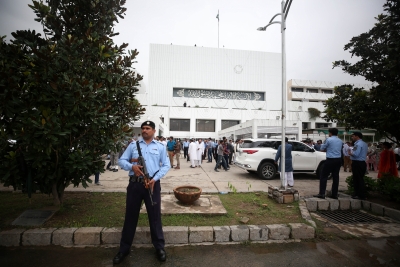Islamabad, Sep 2 (IANS) Conflicts of interest pervade parliamentary decision-making, change both policy and viewpoint in Pakistan as people do not consider parliament as their representative forum but an exclusive club of businessmen legislating for themselves, a report highlighted on Tuesday.
The risks are economic and political as each scandal weakens the legitimacy of democratic institutions, fueling cynicism and disengagement, public policy expert Amir Jahangir wrote in an opinion piece for The News International.
“The credibility of our democracy is undermined when lawmakers with direct business stakes sit in judgment over policies and projects from which they stand to gain. This weakness is most glaring in Pakistan’s Standing Committees of the Senate and National Assembly, where oversight often collapses into opportunity. A recent case involving a donor-funded project has brought these concerns into sharp focus,” he highlighted.
The expert mentioned that, for years, a small group of politically-connected firms, often accused of cartel-style pooled bidding, have been dominating the infrastructure sector of Pakistan. The entry of a competitive foreign state-owned firm interrupts this pattern. By making use of parliamentary committees to force a re-tender, vested interests are not protecting transparency but protecting their cartel. This is why conflict of interest safeguards are needed.
Jahangir, who leads the Country Partner Institute of the World Economic Forum in Pakistan, mentions that the sugar crisis that happened in 2020 showcased the power of industry cartels which have political support. The government’s inquiry commission revealed how leading political families earned money through subsidies, manipulated pricing and favourable export policies. At the time, some of these leaders were members of parliamentary committees which oversaw commerce and industry. This caused regulatory accommodation and consumer had to pay increased prices while cartels consolidated their dominance.
The conflict of interest, he wrote, is also obvious when lawmakers having direct stakes in TV channels or networks, participate in drafting Pakistan Electronic Media Regulatory Authority (Pemra) regulations, broadcasting policies or advertising rules.
“How can those profiting from media monopolies fairly regulate competition, ownership concentration or ethical standards? Instead of a level playing field, the result has been further concentration, with regulatory frameworks bent to protect incumbents. The erosion of media diversity and independence, in turn, undermines public trust and democracy itself. Taken together, the sugar cartels, the media monopolies, the real estate empires and now the infrastructure contracts, Pakistan’s problem is systemic,” he stated.
“Pakistan does have relevant laws, but they fall short. Article 63(1)(d) of the constitution disqualifies a member who holds “an office of profit in the service of Pakistan”. Article 63(1)(o) extends this to members whose dependents are employed by statutory bodies. Yet both clauses are narrowly applied to government service, not to sprawling family-owned enterprises or contracting firms. The Elections Act, 2017 (Section 137) requires lawmakers to declare assets, while Section 111 allows for suspension or disqualification for false declarations. But there is no provision barring participation in legislation or oversight linked to those business interests. Parliament’s own rules attempt to plug the gap but remain toothless,” Jahangir added.
–IANS
akl/as
Disclaimer
The information contained in this website is for general information purposes only. The information is provided by BhaskarLive.in and while we endeavour to keep the information up to date and correct, we make no representations or warranties of any kind, express or implied, about the completeness, accuracy, reliability, suitability or availability with respect to the website or the information, products, services, or related graphics contained on the website for any purpose. Any reliance you place on such information is therefore strictly at your own risk.
In no event will we be liable for any loss or damage including without limitation, indirect or consequential loss or damage, or any loss or damage whatsoever arising from loss of data or profits arising out of, or in connection with, the use of this website.
Through this website you are able to link to other websites which are not under the control of BhaskarLive.in We have no control over the nature, content and availability of those sites. The inclusion of any links does not necessarily imply a recommendation or endorse the views expressed within them.
Every effort is made to keep the website up and running smoothly. However, BhaskarLive.in takes no responsibility for, and will not be liable for, the website being temporarily unavailable due to technical issues beyond our control.
For any legal details or query please visit original source link given with news or click on Go to Source.
Our translation service aims to offer the most accurate translation possible and we rarely experience any issues with news post. However, as the translation is carried out by third part tool there is a possibility for error to cause the occasional inaccuracy. We therefore require you to accept this disclaimer before confirming any translation news with us.
If you are not willing to accept this disclaimer then we recommend reading news post in its original language.

